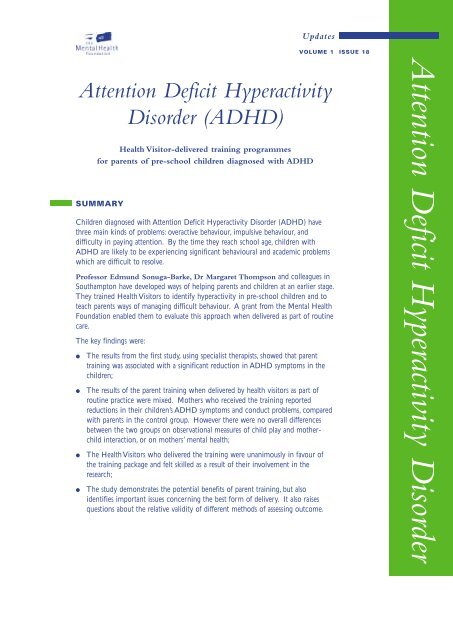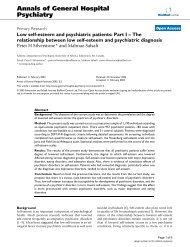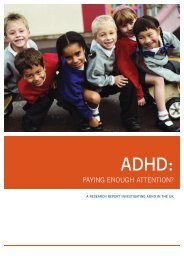Attention Deficit Hyperactivity Disorder - ADDers.org
Attention Deficit Hyperactivity Disorder - ADDers.org
Attention Deficit Hyperactivity Disorder - ADDers.org
Create successful ePaper yourself
Turn your PDF publications into a flip-book with our unique Google optimized e-Paper software.
UpdatesVOLUME 1 ISSUE 18<strong>Attention</strong> <strong>Deficit</strong> <strong>Hyperactivity</strong><strong>Disorder</strong> (ADHD)Health Visitor-delivered training programmesfor parents of pre-school children diagnosed with ADHDSUMMARYChildren diagnosed with <strong>Attention</strong> <strong>Deficit</strong> <strong>Hyperactivity</strong> <strong>Disorder</strong> (ADHD) havethree main kinds of problems: overactive behaviour, impulsive behaviour, anddifficulty in paying attention. By the time they reach school age, children withADHD are likely to be experiencing significant behavioural and academic problemswhich are difficult to resolve.Professor Edmund Sonuga-Barke, Dr Margaret Thompson and colleagues inSouthampton have developed ways of helping parents and children at an earlier stage.They trained Health Visitors to identify hyperactivity in pre-school children and toteach parents ways of managing difficult behaviour. A grant from the Mental HealthFoundation enabled them to evaluate this approach when delivered as part of routinecare.The key findings were:●●●●The results from the first study, using specialist therapists, showed that parenttraining was associated with a significant reduction in ADHD symptoms in thechildren;The results of the parent training when delivered by health visitors as part ofroutine practice were mixed. Mothers who received the training reportedreductions in their children’s ADHD symptoms and conduct problems, comparedwith parents in the control group. However there were no overall differencesbetween the two groups on observational measures of child play and motherchildinteraction, or on mothers’ mental health;The Health Visitors who delivered the training were unanimously in favour ofthe training package and felt skilled as a result of their involvement in theresearch;The study demonstrates the potential benefits of parent training, but alsoidentifies important issues concerning the best form of delivery. It also raisesquestions about the relative validity of different methods of assessing outcome.<strong>Attention</strong> <strong>Deficit</strong> <strong>Hyperactivity</strong> <strong>Disorder</strong>
UpdatesMENTAL HEALTH FOUNDATIONBACKGROUNDADHD is used to describe children who are overactive, impulsive and have difficultyin paying attention. In the UK, about 0.5 to 1% of children are thought to haveattention or hyperactivity problems. Children with ADHD are easily distracted, findit hard to carry out tasks which involve waiting to respond, and have a shortattention span. They frequently underachieve at school, and may also have problemsgetting on with other children. It is therefore important to identify ADHDsymptoms before children go to school, so that they can receive help.Many school-age children with ADHD benefit in the short-term from stimulantmedication, although the benefits are not always maintained. Medication appears tobe less effective with pre-school children, and there are particular concerns about theside-effects of prescribing drugs to young children. Parent training programmes offeran alternative approach, which may be more acceptable to parents than drugs.In their initial study (The New Forest Parent Training Study), Professor Sonuga-Barke and colleagues evaluated two kinds of intervention: parent training (PT) andparent counselling/support (PCS). Children in the PT group showed a significantlygreater reduction in ADHD symptoms than children in the PCS or control groups.The next step was to evaluate whether this kind of intervention can be delivered aspart of routine practice, so that more children and parents can receive help. The aimof the current study was therefore to evaluate the effectiveness of the interventionwhen delivered by trained (but non-specialist) health visitors as part of their everydaycaseload.THE RESEARCH●●●All children in one health district were screened during their routine three-yeardevelopmental check. Parents completed the Werry-Weiss-Peters Activity Scale(Routh 1978) which identifies activity problems in the general population.Parents whose children scored over 20 points on this measure were invited tojoin the study. Parents who agreed to participate were then screened again usingthe Parental Account of Childhood Symptoms Interview (Taylor et al 1993). 79children met the diagnostic criteria for ADHD on both measures. 59 wereallocated to the parent training group and 20 to the control group.15 Health Visitors were randomly selected to deliver the parent training. Parentsin the intervention group received eight one-hour visits, which included adviceon communication, distraction techniques, ways of dealing with tantrums, andother behaviour management techniques.The children were assessed before and after the intervention and at 15 weekfollow-up, using the Parental Account of Childhood Symptoms Interview(PACS), ten minute observations of the child playing with a toy, and ten minuteobservations of the mother playing with the child. The mothers completed theGeneral Health Questionnaire (GHQ) (Goldberg 1978) and the Parental Sense ofCompetence Scale (Mash & Johnston 1989).
MENTAL HEALTH FOUNDATIONUpdatesTHE FINDINGS●●●●●The results from the clinical interview (PACS) showed significant differencesbetween the groups. Parents who had received training reported reductions inthe severity of their children’s ADHD symptoms, while those in the waiting listcontrol group reported increases in severity. Similarly, parents in the traininggroup reported a small decrease in conduct problems, compared with an increasereported by waiting list parents.There were no differences between the two groups on the child play observationsor on the observations of mother-child interactions.There was no difference between the two groups on mothers’ well-being (GHQscores). In both groups mothers tended to perceive themselves as less competentas a parent over time, although this was more marked in the waiting list group.18 parents were selected at random and interviewed about their experience ofthe research project. 16 viewed it positively and commented that the healthvisitor’s help had enabled them to implement new strategies for managing theirchildren’s behaviour. Two felt that the training was not necessary.The Health Visitors were unanimously in favour of the intervention andcommented positively on the level of support they had received while trainingand while delivering the intervention.THE IMPLICATIONS●●●●This study has demonstrated the potential for early interventions for ADHD tobe delivered through routine care. Health Visitors responded positively to theopportunity to acquire new skills and work proactively with parents. Parents inturn reported improvements in children’s behaviour which they attributed to theintervention.At the same time it raises a number of issues concerning the best way ofdelivering such interventions and the most appropriate methods for measuringoutcomes. The lack of a significant impact on the observational measure ofbehaviour, contrasts with the findings of the previous study.Differences in outcome between the two studies may be partially explained bydifferences in the severity of ADHD symptoms and maternal mental health atbaseline. Other factors include the effects of selecting the health visitors byrandomisation to deliver the intervention rather than employing a self-selectedspecialist group.Alternatively, the observational measures used (ten minute samples of behaviour)may be less reliable indicators than expected. Parents may be identifying changesin children’s behaviour or their own which are not detected by standard‘objective’ outcome measures.
UpdatesMENTAL HEALTH FOUNDATIONREFERENCESGoldberg, D. (1978) ‘Manual for the General Health Questionnaire’ Slough, NFER.Routh, D. (1978) ‘<strong>Hyperactivity</strong>’ nn P Magrab ed. Psychological management of paediatricproblems.Vol 2. Baltimore, University Park Press.Sonuga-Barke, E., Daley, D.,Thompson, M., Laver-Bradbury, C. & Weeks, A. (inpress).‘Parent Based Therapies for <strong>Attention</strong> <strong>Deficit</strong> / <strong>Hyperactivity</strong> <strong>Disorder</strong>: aRandomised Controlled Trial’.Taylor, E., Schachar, R. & Hepstinall, E. (1993) ‘Manual for Parental Account ofChildhood Symptoms Interview’ Maudsley Hospital, London.Further reading & resources:‘All about ADHD.’ Borrill, J. The Mental Health Foundation, 2000. Informationbooklet for parents, families and professionals working with children with ADHD.‘Information Manual for Professionals working with Families with HyperactiveChildren aged 2-9 years.’ Anne Weeks, Dr. Margaret Thompson, Cathy Laver-Bradbury. (1999) Ashurst Child & Family Guidance Centre, Hampshire.‘Always on the Go’. Dr. Margaret Thompson, Cathy Laver-Bradbury, MichaelVanstraellen & Anne Weeks. University of Southampton.Video for professionals and parents which accompanies the above manual.Hyperactive Children: A Practical Guide for Parents. Dr Joanne Barton.The Child &Family Trust, Glasgow.Series editor: Lisa BirdThis Update was written by Dr. Jo Borrill, Clinical Research Manager at the MentalHealth Foundation, in consultation with the research team.The Mental Health Foundation is grateful to Glaxo Wellcome plc for funding thisresearch.For information on subscribing to Updates, please call 020 7802 0300The Mental Health Foundation7th Floor, 83 Victoria Street, London SW1H 0HWTel: 020 7802 0300 Fax: 020 7802 0301The Mental Health Foundation Scotland24 Ge<strong>org</strong>e Square, Glasgow G2 1EGTel: 0141 572 0125 Fax: 0141 572 0246E-mail: mhf@mhf.<strong>org</strong>.ukWebsite: http://www.mentalhealth.<strong>org</strong>.ukRegistered Charity No. 801130© The Mental Health Foundation 2000




